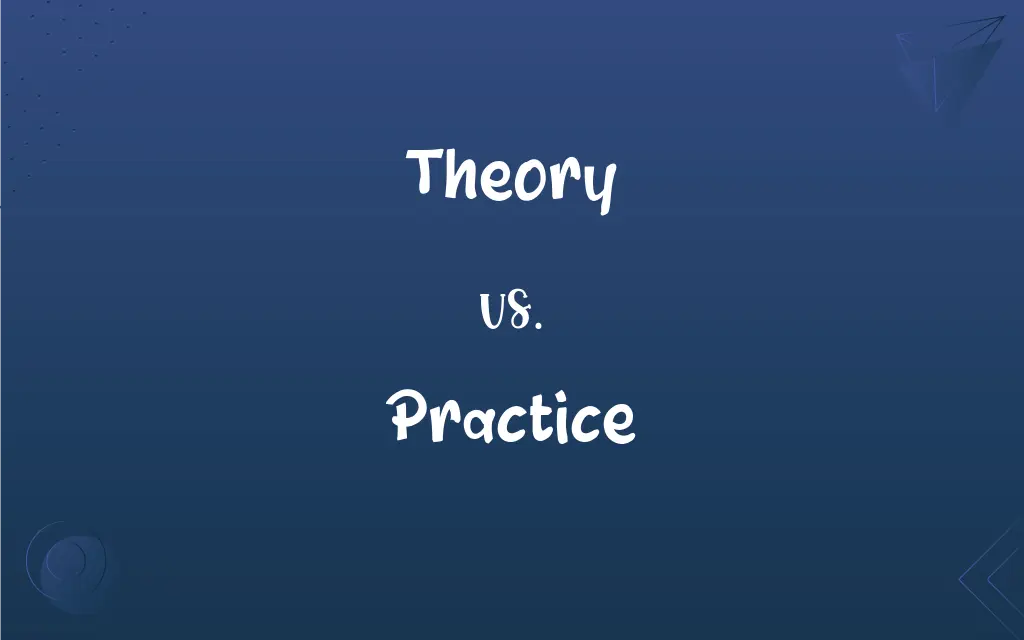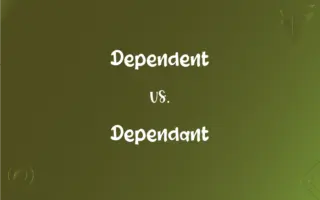Theory vs. Practice: What's the Difference?
Edited by Aimie Carlson || By Harlon Moss || Published on June 22, 2024
Theory is a set of principles or ideas that explain something, while practice is the actual application or use of those theories in real-life situations.

Key Differences
Theory refers to a set of principles, ideas, or concepts that aim to explain phenomena or provide a framework for understanding how things work. Theories are often based on abstract reasoning, hypotheses, and empirical evidence. Practice, on the other hand, involves the actual application or implementation of theories, principles, or techniques in real-life situations. It is the hands-on, practical aspect of learning and doing, where theoretical knowledge is put to use.
Theory and practice are interconnected, with theory providing the foundation for practical applications. In many fields, such as medicine, education, and engineering, theories guide practice, while practical experiences can lead to the development or refinement of theories.
One of the challenges in many disciplines is bridging the gap between theory and practice. While theories can provide a broad understanding, their practical implementation may face real-world complexities and constraints.
Both theory and practice are essential for the advancement of knowledge and skills. Theory provides the conceptual framework, while practice allows for the testing and refinement of theories, leading to a deeper understanding and improved applications.
Comparison Chart
Definition
A set of principles or ideas that explain something
The actual application or use of theories in real-life situations
ADVERTISEMENT
Nature
Abstract and conceptual
Concrete and practical
Purpose
To provide understanding and explanation
To apply and implement theoretical knowledge
Role in Learning
Provides the foundation and framework
Allows for hands-on experience and skill development
Interaction with Reality
Often developed through observation and analysis
Direct engagement with real-world situations
Theory and Practice Definitions
Theory
A hypothesis or set of principles developed through scientific research.
Quantum theory provides a framework for understanding the behavior of particles at the atomic level.
ADVERTISEMENT
Practice
The habitual or repeated performance of an activity to improve proficiency.
Regular practice is essential for mastering a musical instrument.
Theory
A systematic set of ideas that explain a phenomenon.
The theory of evolution explains the diversity of life on Earth.
Practice
The actual execution or implementation of techniques or methods.
The practice of yoga involves physical postures, breathing techniques, and meditation.
Theory
A conceptual framework that guides analysis and understanding.
Social contract theory explores the origins and legitimacy of state authority.
Practice
The professional work carried out by practitioners in a field.
Legal practice requires a thorough understanding of laws and regulations.
Theory
An abstract explanation for observed patterns or behaviors.
Game theory analyzes strategic interactions among rational decision-makers.
Practice
The application of knowledge or skills in real-life situations.
Medical students gain hands-on experience through clinical practice.
Theory
A body of knowledge that offers a systematic understanding of a subject.
Economic theory studies how resources are allocated and distributed in society.
Practice
The customary or routine way of doing something.
It is common practice to shake hands when greeting someone in many cultures.
Theory
A set of statements or principles devised to explain a group of facts or phenomena, especially one that has been repeatedly tested or is widely accepted and can be used to make predictions about natural phenomena.
Practice
To do or perform habitually or customarily; make a habit of
Practices courtesy in social situations.
Theory
The branch of a science or art consisting of its explanatory statements, accepted principles, and methods of analysis, as opposed to practice
A fine musician who had never studied theory.
Practice
To do or perform (something) repeatedly in order to acquire or polish a skill
Practice a dance step.
FAQs
What is practice?
Practice is the actual application or use of theoretical knowledge in real-life situations.
What is a theory?
A theory is a set of principles or ideas that aim to explain phenomena or provide a framework for understanding how things work.
Can practice exist without theory?
Practice can exist without a formal theory, but it is often guided by underlying principles or informal theories.
How can theory be applied in practice?
Theory can be applied in practice through the implementation of its principles, techniques, or methods in real-life situations, often adapted to fit specific contexts.
What are some challenges in applying theory to practice?
Challenges in applying theory to practice include adapting theoretical concepts to real-world complexities, overcoming practical constraints, and ensuring the relevance of theory to practical situations.
Why is it important to bridge the gap between theory and practice?
Bridging the gap between theory and practice is important for effective learning, application of knowledge, and the advancement of both theoretical understanding and practical skills.
What is the importance of reflective practice in connecting theory and practice?
Reflective practice is important for connecting theory and practice as it involves critically analyzing one's own experiences and practices, leading to deeper understanding and improved application of theory.
How are theory and practice related?
Theory and practice are interconnected; theory provides the foundation for practical applications, and practice allows for the testing and refinement of theories.
How do educational programs integrate theory and practice?
Educational programs integrate theory and practice through a combination of coursework, hands-on training, internships, and practical assignments that allow students to apply theoretical knowledge in real-world contexts.
Can a theory exist without practice?
A theory can exist without practice as a conceptual framework, but its practical relevance and validity are often established through application.
What are some examples of fields where the integration of theory and practice is crucial?
Fields where the integration of theory and practice is crucial include medicine, education, engineering, psychology, and business.
How can practice inform theory?
Practice can inform theory by providing empirical evidence, highlighting gaps or limitations in existing theories, and inspiring the development of new theories or refinements.
What is the difference between theoretical knowledge and practical knowledge?
Theoretical knowledge is based on abstract concepts and principles, while practical knowledge is gained through direct experience and application of skills.
What is the role of feedback in linking theory and practice?
Feedback plays a crucial role in linking theory and practice by providing information on the effectiveness of practical applications, leading to adjustments in theory or practice as needed.
What is the role of experimentation in theory and practice?
Experimentation plays a crucial role in both theory and practice by testing hypotheses, validating theoretical predictions, and refining practical techniques.
How do researchers test theories in practice?
Researchers test theories in practice through empirical studies, experiments, and observations that examine the validity and applicability of theoretical propositions.
How do professionals balance theory and practice in their work?
Professionals balance theory and practice by grounding their work in established principles while adapting their approach to meet the demands of practical situations.
How can practitioners stay updated with the latest theories and practices in their field?
Practitioners can stay updated with the latest theories and practices in their field by engaging in continuous learning, attending professional development workshops, reading scholarly journals, and participating in industry conferences.
Can a practice become a theory?
A practice can contribute to the development of a theory if it is systematically analyzed, generalized, and used to formulate principles that explain or predict phenomena.
How do changes in practice affect existing theories?
Changes in practice can affect existing theories by challenging their assumptions, prompting re-evaluation, and leading to modifications or the development of new theories.
About Author
Written by
Harlon MossHarlon is a seasoned quality moderator and accomplished content writer for Difference Wiki. An alumnus of the prestigious University of California, he earned his degree in Computer Science. Leveraging his academic background, Harlon brings a meticulous and informed perspective to his work, ensuring content accuracy and excellence.
Edited by
Aimie CarlsonAimie Carlson, holding a master's degree in English literature, is a fervent English language enthusiast. She lends her writing talents to Difference Wiki, a prominent website that specializes in comparisons, offering readers insightful analyses that both captivate and inform.






































































